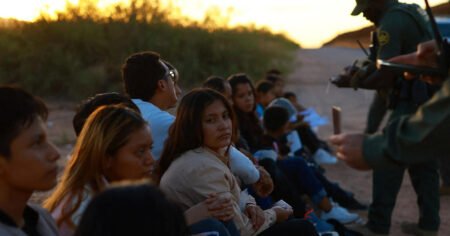In Nogales, Mexico, a Mexican border city, migrants deported by the U.S. were visibly demoralized and disoriented. One migrant named Emmanuel expressed desperation as he was returned from the U.S. and now faced uncertainty about his future. He had hoped to work in the U.S. to send money back to his family in Chiapas, Mexico, but was quickly apprehended by U.S. border agents and sent back to Mexico. Like Emmanuel, several dozen migrants, including families with small children, were deported to Nogales, where they awaited guidance from officials and volunteers near a port of entry between the U.S. and Mexico.
Some deportees lacked shoelaces, had few belongings, and wore standard clothing issued by U.S. Border Patrol. American volunteers provided fruit, guidance, and information on shelters for the deportees to stay while they figured out their next steps. Children deported also received toys. Among those deported were Rosalis and her daughters, who were sent back after she sought safety for her children from harassment. These scenes are common in Nogales due to President Biden’s executive actions to restrict access to the U.S. asylum system, leading to an increase in deportations to Mexican border cities like Nogales.
President Biden’s executive actions have changed U.S. asylum law, disqualifying migrants who cross the southern border between legal entry points from asylum eligibility and making it harder for migrants to express fear of harm if deported. This has led to a significant drop in the number of migrants accessing the U.S. asylum system and an increase in deportations from countries like Mexico and Central America. Since the implementation of Biden’s orders, deportations of migrants have more than doubled, while illegal border crossings have decreased significantly due to Mexico’s efforts and restrictive asylum policies.
While the decrease in illegal border crossings might be seen as a success of Biden’s policies, humanitarian workers like Dora Rodriguez warn that vulnerable migrants in need of protection are being turned away. Many migrants are fleeing violence, hunger, and organized crime, yet are being punished by U.S. laws. Rodriguez believes the stricter asylum rules will push migrants to attempt dangerous journeys through remote areas like the Arizona desert, where they could face serious risks, including death. Despite the challenges and risks involved, migrants like Rosalis are willing to risk everything to seek safety and a better future for their families.
Overall, the situation in Nogales highlights the human toll of U.S. immigration policies and the struggles faced by deported migrants seeking refuge and security. As deportations continue to increase and asylum access remains restricted, many migrants find themselves in limbo, unsure of their next steps and facing the harsh realities of a broken immigration system. While the decrease in illegal border crossings might be viewed as a success by some, the impact on vulnerable migrants and their families cannot be ignored. As the debate over immigration policy continues, the voices and stories of those directly affected by these policies must be heard and considered.











